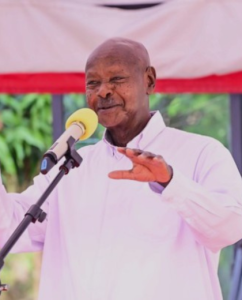Trump now sending migrants to Africa
Uganda’s move to agree to accept an offer by the Trump administration to take migrants rejected by the US has sparked a storm of criticism within the East African nation.
Uganda already hosts Africa largest refugee population. And now is the fourth African nation that has agreed to receive foreign US deportees. The Trump administration has struck similar deals with Rwanda, South Sudan and Eswatini.
Uganda’s Opposition Leader Mathias Mpuuga said the scheme “stinks” and does not have parliamentary oversight. 
Uganda’s foreign ministry recently announced it had reached a “temporary arrangement” with the US to accept deported foreign migrants “who may not be granted asylum in the United States but are reluctant to or may have concerns about returning to their countries of origin”.
But it said people with criminal records and unaccompanied minors will not be accepted.
“Uganda also prefers that individuals from African countries shall be the ones transferred to Uganda,” the announcement said.
Recently, US Secretary of State Marco Rubio spoke with Ugandan President Yoweri Museveni, according to the US State Department said that they discussed “opportunities to deepen US-Uganda cooperation on migration, reciprocal trade, and commercial ties”.
It is not known how many deportees are expected from the US, or when they are due to arrive in Uganda.
Museveni’s press secretary, Sandor Lyle, did not respond to CNN’s request for additional comment Thursday.
Agencies and advocated in Uganda, one of the world’s poorest countries, are concerned that its resources, which are already burdened with accommodating almost two million refugees – most of whom fled conflict in neighbouring South Sudan and the Democratic Republic of the Congo – will be further stretched if migrants were to arrive from the US.
“Uganda already has one of the world’s highest refugee populations, and this merely exerts more pressure on its scarce resources,” journalist and researcher Raymond Mujuni told media.
Uganda has previously been criticised over third-country deportations.
In 2018, Amnesty International said in a report that around 1,750 Eritrean and Sudanese asylum seekers were deported to Uganda by Israel between 2015 and 2018.
Ugandan authorities denied those claims, saying they had no such arrangement with Israel.
President Museveni, 80, has ruled Uganda with an iron fist since 1986 and plans to run for a fresh term in the upcoming polls.
Meanwhile, South Africa has denounced the Trump administration’s policy of offering refugee status to members of the white Afrikaner minority, saying it resembled the country’s own past of racial segregation.
South Africa’s foreign minister Ronald Lamo said Washington’s preferential treatment of white Afrikaners for resettlement into the United States amounted to “apartheid 2.0”.
A first group of around 50 Afrikaners, who are descendants of the first European settlers of South Africa, were flown to the US on a chartered plane in May.
Others have reportedly followed in smaller numbers and on commercial flights.
President Trump has effectively halted refugee arrivals after taking office in January, but made an exception for the Afrikaners, despite Pretoria’s insistence that they do not face persecution.
Relations between South Africa and the US plunged to a new low after Trump took office, expelling Pretoria’s ambassador in March.
He later imposed 30 per cent tariffs on exports from South Africa, which has been negotiating for a reduction to avoid potential job losses.












